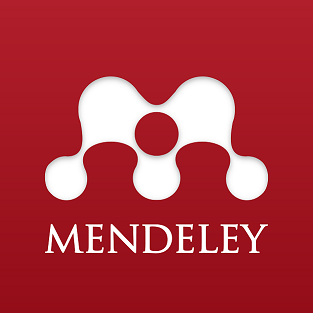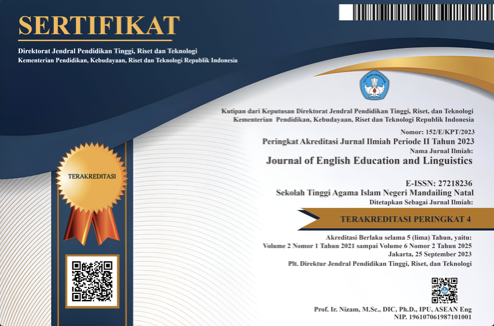DESIGNING AUTHENTIC ASSESSMENT MODEL FOR WRITING SKILL AT JUNIOR HIGH SCHOOL STUDENTS
DOI:
https://doi.org/10.56874/jeel.v2i1.402Keywords:
Authentic assessment, junior high school students, writing skillAbstract
Assessing writing is one of the difficulties most English teachers face. Compared to other English skills, writing is generally regarded as the most complicated skill. The media for assessing writing should preferably cover several principles to face this challenge, one of which is authenticity. Authentic assessment is a form of assessment that connects learners to actual life and promotes the fair exploration of three domains. The main objective of this research is to design authentic assessment model for assessing writing skill at junior high school students. This research utilized Research and Development approach which carried out the first years students of Islamic Junior High school (MTsN) Batusangkar and two English teachers as participants. In gaining data, researcher used questionnaire and structured interview. The questionnaire consisted of 30 question related to the authentic assessment. In order to dig deep data related to writing assessment for junior high school students, researchers used unstructured questions. The finding revealed that the personal report is ideally an effective authentic evaluation model for assessing students' writing skills, especially for junior high school students.
References
Badan Standar Nasional Pendidikan (BSNP). 2006. Standar Isi untuk Satuan Pendidikan Dasar dan Menengah. Jakarta: Badan Standar Nasional Pendidikan
Brown, H. Douglas. 2001. Teaching by Principles: An Interactive Approach to Language Pedagogy Second Edition . New York: Pearson Education, Inc.
Brown, Douglas and Abeywickrama, Priyanvada. 2004. Language assessment
and classroom principles. Pearson Education: New York.
Choate, S. Joyce, and Susan S Evans. 1992. Authentic Assessment of Special Learner: Problem and Promise. Education Journal Northeast Louisiana University.
Depdiknas. 2006. Rancangan Penilaian Hasil Belajar. Jakarta: Depdiknas.
Fook, C.Y., & Sindhu, G.K. 2010. Authentic Assessment and Pedagogical Strategies in Higher Education. Journal of Social Sciences, 6 (2), 153-161.
Hughes. A. 2003. Testing for Language teachers: 2nd edition. Cambridge: Cambridge University Press.
Hyland, Ken. 2003. Second Language Writing. Cambridge: Cambridge University.
Nana, S. Sukmadinata. 2006. Metode Penelitian Pendidikan. Bandung: Remaja Rosdakarya.
Natalia, Devia Elva, Abdul Asib, & Diah Kristina. 2018. The Application of Authentic Assessment for Students Writing Skill. Journal of Education and Human Development. June 2018, Vol. 7, No. 2, pp. 49-53 ISSN: 2334-296X
Nation, I. S. P. 2009. Teaching ESL/EFL Reading and Writing. New York: Routledge.
O’Malley, J. Michael and Lorraine Valdez Pierce 1996. Authentic Assessment for English Language Learners: Practical Approaches for Teachers. New York: Addison-Wesley Publishing Company.
Shepard, L. A. 2000. The role of assessment in a learning culture. Educational Researcher, 29(7), 4‒14.
The Ministry of Education and Culture Republic of Indonesia. 2016. The government regulation nomor 23: standar penilaian pendidikan.
Wiggins, Grant. 1998. Ensuring authentic performance. Chapter 2 in Educative Assessment: Designing Assessments to Inform and Improve Student Performance. San Francisco: Jossey-Bass, pp. 21 – 42.
Downloads
Published
Issue
Section
License
All articles published in the Journal of English Education and Linguistics are licensed under a Creative Commons Attribution-ShareAlike 4.0 International (CC BY-SA) license. This means anyone is free to copy, transform, or redistribute articles for any lawful purpose in any medium, provided they give appropriate attribution to the original author(s) and Journal of English Education and Linguistics, link to the license, indicate if changes were made, and redistribute any derivative work under the same license.
Copyright on articles is retained by the respective author(s) without restrictions. A non-exclusive license is granted to the Journal of English Education and Linguistics to publish the article and identify itself as its original publisher, along with the commercial right to include the article in a hardcopy issue for sale to libraries and individuals.
Although the conditions of the Creative Commons Attribution-ShareAlike 4.0 International (CC BY-SA) license do not apply to authors (as the copyright holder of your article, you have no restrictions on your rights), by submitting to the Journal of English Education and Linguistics, authors recognize the rights of readers and must grant any third party the right to use their articles to the extent provided by the license.

This work is licensed under a Creative Commons Attribution-ShareAlike 4.0 International License.








